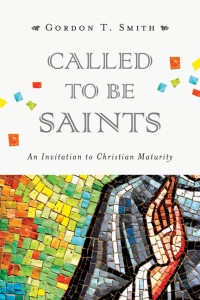 Called to Be Saints: An Invitation to Christian Maturity
Called to Be Saints: An Invitation to Christian Maturity
By Gordon T. Smith
My rating: 4 of 5 stars
This book might change your thinking about “sainthood”. Sometimes, we conceive saints as these unworldly, serious, ascetic, and somewhat odd creatures. Gordon Smith would propose instead that being a saint is something to which all of us are called and what this means is growth into Christian maturity–a kind of perfection of holiness that isn’t perfectionism but rather a kind of completeness or wholeness of life.
This is especially important for many evangelicals, who may excel at seeing people come to faith but have little idea of how to direct them into becoming holy (or sanctified, a word drawn from the same root as saint–in other words, saintified). Most often, since we do the crisis experience of conversion so well, we simply propose additional crisis experiences. Smith proposes a different route.
Smith begins with what he sees as the essence of the Christian life, which is union with Christ. To be in Christ is to be united with Christ through his Spirit, which is a profoundly humbling thing that promotes our dependence upon Christ, our focus on the person and work of Christ, and our Spirit-enabled obedience of faith. In a later appendix, Smith applies this to the scholarly life, which is a life grounded in prayerful dependence upon Christ and illumined by Christ.
Smith then talks about four expressions of holiness that might surprise you. The first of these is wisdom, the practical understanding and knowledge of how to live well in the fear of the Lord. This can be expressed as having the mind of Christ, of seeing all of life through the lenses of creation, fall, and Christ’s redemptive work. Wisdom that understands the cross understands suffering in light of the cross.
The second expression of holiness is vocational holiness. By this, Smith means a life of good work that flows out of a sense of being called both into union with Christ, and into the world. Vocational holiness understands our agency in the world as fallen but redeemed image-bearers of God. It involves self-understanding of our temperament, skills, gifts and situation and lives in hopeful realism throughout the seasons of one’s life.
The third expression of holiness is social holiness expressed in our love for others in the communities to which we are called. This will find expression in radical hospitality where we welcome each other as we have been welcomed in Christ, forbearance, forgiveness and reconciliation, and in generous service to others. All of these are formed in the worship, teaching, and witness of our churches.
Finally, and surprisingly, Smith speaks of joyful holiness–the ordering of our emotional lives around our hope in Christ. He sees these particularly worked out in the practices of worship, friendship, and sabbath. This last is especially radical because in sabbath, we trust that while we must rest God doesn’t and his work is prior to and over ours.
The book concludes with two extended appendices, one addressed to applying these truths to the life of the church, and the other to the life of the academy, particularly, but not exclusively the Christian university and seminary.
I came away from this book with a different rubric for thinking about Christian maturity that is neither obsessed with sin nor activity, but rather in the kind of person we become in union with Christ–wise, called, loving, and joyful. That is a kind of “sainthood” that seems quite attractive, and one to which all, and not simply some “spiritual elite”, might aspire.
Thank-you to Bob for sharing Called to Be Saints: An Invitation to Christian Maturity from his blog Bob on Books. For other posts which refer to the work of Gordon T. Smith, click here.
As we consider Martin Luther King, Jr., I am struck unique nature of growing in Christian maturity. For Bob’s review of Birmingham Revolution: Martin Luther King Jr.’s Epic Challenge to the Church (Edward Gilbreath, InterVarsity Press, 2013), click here. ~ Thomas B. Grosh IV, Associate Director, Emerging Scholars Network
Bob Trube is Associate Director of Faculty Ministry and Director of the Emerging Scholars Network. He blogs on books regularly at bobonbooks.com. He resides in Columbus, Ohio, with Marilyn and enjoys reading, gardening, choral singing, and plein air painting.

Leave a Reply